
Bluetooth is a short-range wireless technology standard that is used for exchanging data between fixed and mobile devices over short distances and building personal area networks (PANs). In the most widely used mode, transmission power is limited to 2.5 milliwatts, giving it a very short range of up to 10 metres (33 ft). It employs UHF radio waves in the ISM bands, from 2.402 GHz to 2.48 GHz. It is mainly used as an alternative to wired connections to exchange files between nearby portable devices and connect cell phones and music players with wireless headphones.
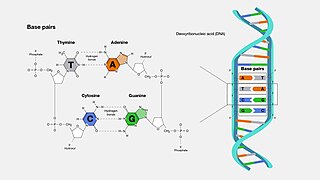
A base pair (bp) is a fundamental unit of double-stranded nucleic acids consisting of two nucleobases bound to each other by hydrogen bonds. They form the building blocks of the DNA double helix and contribute to the folded structure of both DNA and RNA. Dictated by specific hydrogen bonding patterns, "Watson–Crick" base pairs allow the DNA helix to maintain a regular helical structure that is subtly dependent on its nucleotide sequence. The complementary nature of this based-paired structure provides a redundant copy of the genetic information encoded within each strand of DNA. The regular structure and data redundancy provided by the DNA double helix make DNA well suited to the storage of genetic information, while base-pairing between DNA and incoming nucleotides provides the mechanism through which DNA polymerase replicates DNA and RNA polymerase transcribes DNA into RNA. Many DNA-binding proteins can recognize specific base-pairing patterns that identify particular regulatory regions of genes.
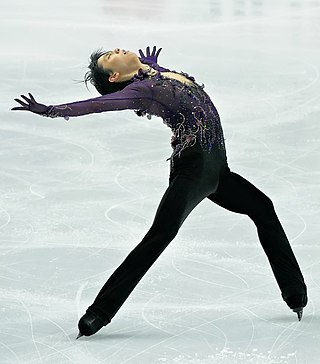
Figure skating is a sport in which individuals, pairs, or groups perform on figure skates on ice. It was the first winter sport to be included in the Olympic Games, with its introduction occurring at the 1908 Olympics in London. The Olympic disciplines are men's singles, women's singles, pair skating, and ice dance; the four individual disciplines are also combined into a team event, which was first included in the Winter Olympics in 2014. The non-Olympic disciplines include synchronized skating, Theater on Ice, and four skating. From intermediate through senior-level competition, skaters generally perform two programs, which, depending on the discipline, may include spins, jumps, moves in the field, lifts, throw jumps, death spirals, and other elements or moves.

In mathematics, an ordered pair (a, b) is a pair of objects. The order in which the objects appear in the pair is significant: the ordered pair (a, b) is different from the ordered pair (b, a) unless a = b. (In contrast, the unordered pair {a, b} equals the unordered pair {b, a}.)
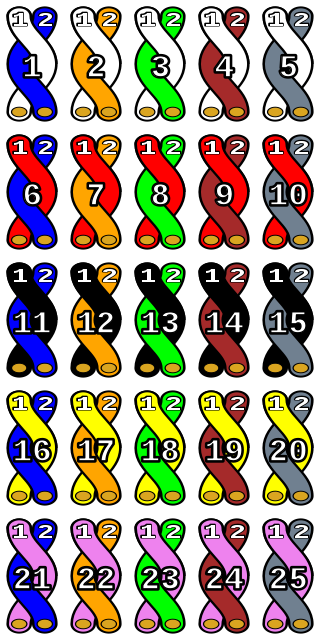
Twisted pair cabling is a type of communications cable in which two conductors of a single circuit are twisted together for the purposes of improving electromagnetic compatibility. Compared to a single conductor or an untwisted balanced pair, a twisted pair reduces electromagnetic radiation from the pair and crosstalk between neighbouring pairs and improves rejection of external electromagnetic interference. It was invented by Alexander Graham Bell.

Centipedes are predatory arthropods belonging to the class Chilopoda of the subphylum Myriapoda, an arthropod group which includes millipedes and other multi-legged animals. Centipedes are elongated segmented (metameric) creatures with one pair of legs per body segment. All centipedes are venomous and can inflict painful stings, injecting their venom through pincer-like appendages known as forcipules or toxicognaths, which are actually modified legs instead of fangs. Despite the name, no centipede has exactly 100 pairs of legs; the number of pairs of legs is an odd number that ranges from 15 pairs to 191 pairs.
Classical conditioning is a behavioral procedure in which a biologically potent stimulus is paired with a neutral stimulus. The term classical conditioning refers to the process of an automatic, conditioned response that is paired with a specific stimulus.

Sir Steven Geoffrey Redgrave is a British retired rower who won gold medals at five consecutive Olympic Games from 1984 to 2000. He has also won three Commonwealth Games gold medals and nine World Rowing Championships golds. He is the most successful male rower in Olympic history, and the only man to have won gold medals at five Olympic Games in an endurance sport.

Sania Mirza is an Indian former professional tennis player. A former doubles world No. 1, she won six major titles – three in women's doubles and three in mixed doubles. From 2003 until her retirement from singles in 2013, she was ranked by the Women's Tennis Association as the No. 1 Indian in singles. Throughout her career, Mirza has established herself as one of the most known, highest-paid, and influential athletes in India.

In botany, a bract is a modified or specialized leaf, especially one associated with a reproductive structure such as a flower, inflorescence axis or cone scale. Bracts are usually different from foliage leaves; they may be of a different size, color, shape, or texture. Typically, they also look different from the parts of the flower, such as the petals or sepals. A plant having bracts is referred to as bracteate or bracteolate, while one that lacks them is referred to as ebracteate or ebracteolate.
An au pair is a person from a foreign country working for, and living as part of, a host family. Typically, au pairs take on a share of the family's responsibility for child care as well as some housework, and receive a monetary allowance or stipend for personal use. Au pair arrangements are often subject to government restrictions which specify an age range usually from mid teens to late twenties, and may explicitly limit the arrangement to females. The au pair program is considered a form of cultural exchange that gives the family and the au pairs a chance to experience and learn new cultures.

Power over Ethernet (PoE) describes any of several standards or ad hoc systems that pass electric power along with data on twisted-pair Ethernet cabling. This allows a single cable to provide both a data connection and enough electricity to power networked devices such as wireless access points (WAPs), IP cameras and VoIP phones.
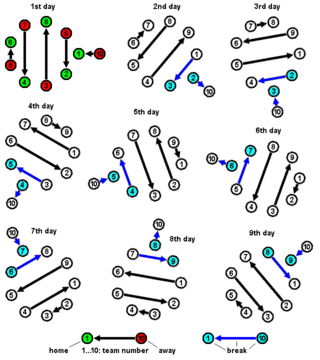
A round-robin tournament or all-play-all tournament is a competition format in which each contestant meets every other participant, usually in turn. A round-robin contrasts with an elimination tournament, wherein participants are eliminated after a certain number of wins or losses.

Badminton had its debut as an official event on the 1992 Summer Olympics and has been contested in eight Olympiads. 74 different nations have appeared in the Olympic badminton competitions, with 18 appearing all eight times. It is governed by the Badminton World Federation.

An ox, also known as a bullock, is a bovine, trained and used as a draft animal. Oxen are commonly castrated adult male cattle; castration inhibits testosterone and aggression, which makes the males docile and safer to work with. Cows or bulls may also be used in some areas.

In biology, a pair bond is the strong affinity that develops in some species between a mating pair, often leading to the production and rearing of young and potentially a lifelong bond. Pair-bonding is a term coined in the 1940s that is frequently used in sociobiology and evolutionary biology circles. The term often implies either a lifelong socially monogamous relationship or a stage of mating interaction in socially monogamous species. It is sometimes used in reference to human relationships.
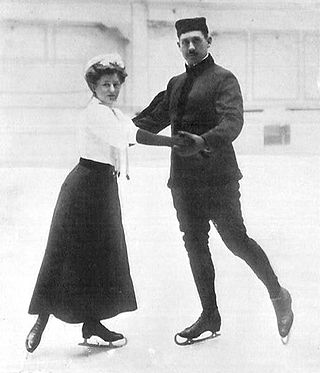
Pair skating is a figure skating discipline defined by the International Skating Union (ISU) as "the skating of two persons in unison who perform their movements in such harmony with each other as to give the impression of genuine Pair Skating as compared with independent Single Skating". The ISU also states that a pairs team consists of "one Woman and one Man". Pair skating, along with men's and women's single skating, has been an Olympic discipline since figure skating, the oldest Winter Olympic sport, was introduced at the 1908 Summer Olympics in London. The ISU World Figure Skating Championships introduced pair skating in 1908.

John William Peers is an Australian professional tennis player who specialises in doubles.
The 2015–16 ISU World Standings and Season's World Ranking, are the World Standings and Season's World Ranking published by the International Skating Union (ISU) during the 2015–16 season.















